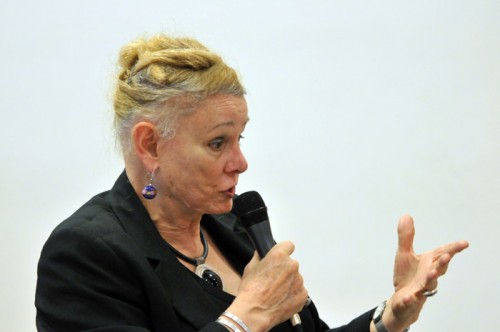Nice Work by David Lodge
by David Lodge
—-
What happens when an expert on 19th-century British industrial novels—who is a professor, a feminist, and a deconstructionist–finds herself in an actual factory?
This not being a time-travel novel, the factory is a contemporary one for the book’s setting in mid-1980s Britain. It is a metalworking plant called Pringle’s, run by managing director Vic Wilcox. Vic is not thrilled when his boss (Pringle’s is owned by a conglomerate) suggests that he participate in something called the “shadow” program, designed to make academics and businesspeople better-acquainted with one another, but he goes along with the request.
Robyn Penrose, literature professor at a nearby university, is also not thrilled about her nomination to participate in the program, but she is concerned about her job in an era of reduced university funding, and also thinks she had better do as asked. The way the program works is that Robyn will be Vic’s “shadow,” joining him at the plant every Wednesday, sitting in on his regular activities, and learning just a bit about what is involved in managing a business.
Vic is a self-made man, not well-educated and with few interests outside work. He is acutely aware of the danger that faces Pringle’s under the current economic climate, and is resolved that his factory will not join the long list of those that have been tossed on the scrapheap.
There is nothing quite so forlorn as a closed factory–Vic Wilcox knows, having supervised a shutdown himself in his time. A factory is sustained by the energy of its own functioning, the throb and whine of machinery, the unceasing motion of assembly lines, the ebb and flow of workers changing shifts, the hiss of airbrakes and the growl of diesel engines from wagons delivering raw materials at one gate, taking away finished goods at the other. When you put a stop to all that, when the place is silent and empty, all that is left is a large, ramshackle shed–cold, filthy and depressing. Well, that won’t happen at Pringle’s, hopefully, as they say. Hopefully.
Robyn and Vic dislike each other on first meeting: Vic sees Robyn’s profession as useless, which Robyn sees Vic’s managerial role as brutal and greedy. She is appalled by what she sees in her first tour of the factory..especially the foundry:
They crossed another yard, where hulks of obsolete machinery crouched, bleeding rust into their blankets of snow, and entered a large building with a high vaulted roof hidden in gloom. This space rang with the most barbaric noise Robyn had ever experienced…The floor was covered with a black substance that looked like soot, but grated under the soles of her boots like sand. The air reeked with a sulphurous, resinous smell, and a fine drizzle of black dust fell on their heads from the roof. Here and there the open doors of furnaces glowed a dangerous red, and in the far corner of the building what looked like a stream of molten lave trickled down a curved channel from roof to floor…It was the most terrible place she had ever been in her life. To say that to herself restored the original meaning of the word “terrible”: it provoked terror, even a kind of awe. To think of being that man, wrestling with the heavy awkward lumps of metal in that maelstrom of heat, dust and stench, deafened by the unspeakable noise of the vibrating grid, working like that for hour after hour, day after day….That he was black seemed the final indignity: her heart swelled with the recognition of the spectacle’s powerful symbolism.
But still:
The situation was so bizarre, so totally unlike her usual environment, that there was a kind of exhilaration to be found in it…She thought of what her colleagues and students might be doing this Wednesday morning–earnestly discussing the poetry of John Donne or the novels of Jane usten or the nature of modernism, in centrally heated, carpeted rooms…Penny Black would be feeding more statistics on wife-beating in the West Midlands into her data-based, and Robyn’s mother would be giving a coffee morning for some charitable cause…What would they all think if they could see her now?
Read more
which is the second in a trilogy with The Bourgeois Virtues: Ethics for an Age of Commerce
. She announced last night that she just finished the third volume.
